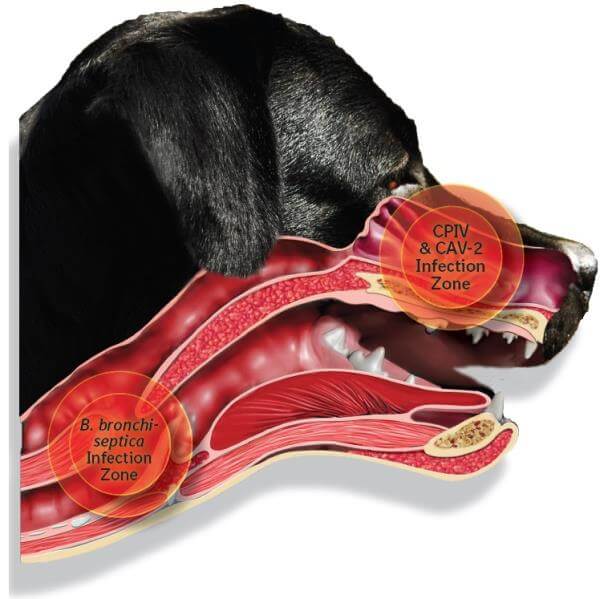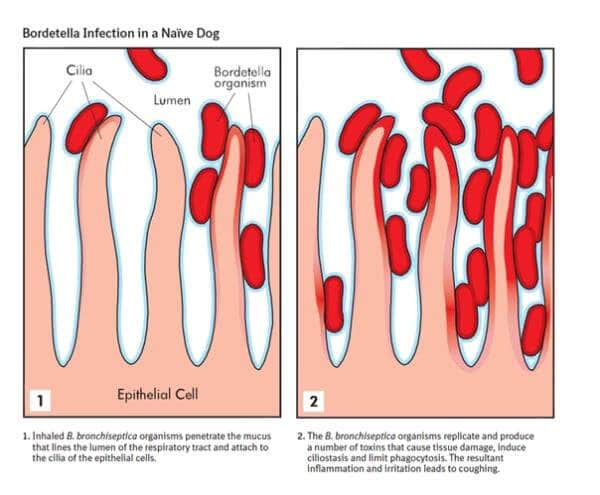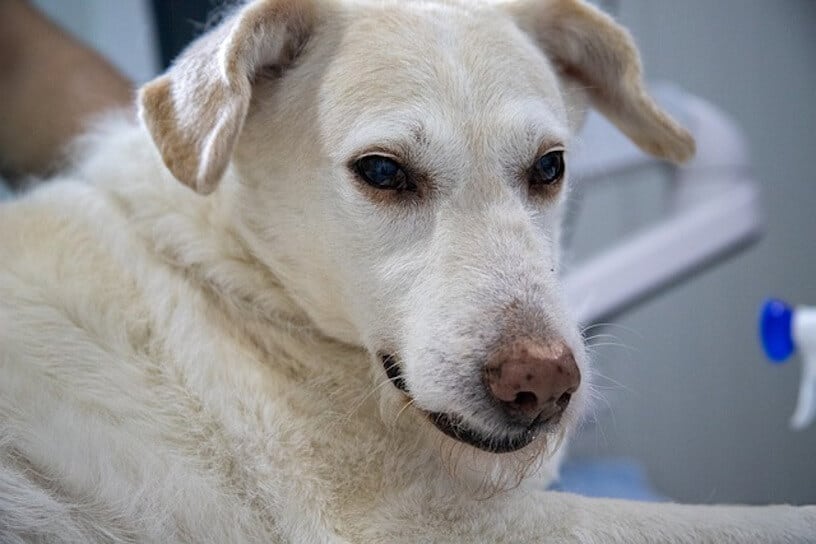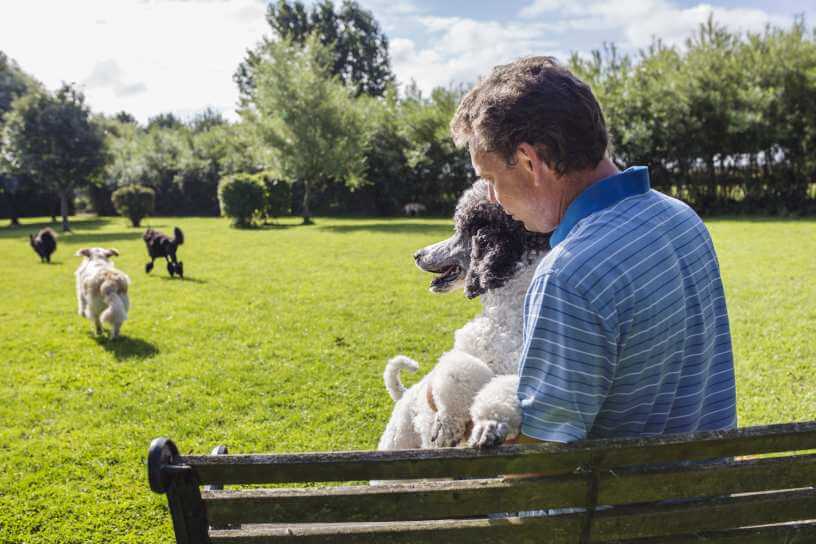Table of Contents
ToggleIn the dog owner community, kennel cough is always a hot topic. This is because most dogs suffer from it at least once in their lives.
We wrote this article to help devoted dog parents understand and successfully navigate through the challenging process of overcoming kennel cough in dogs.

What is Kennel Cough?
Rather than being a single disease, kennel cough is highly-contagious, upper respiratory tract infection syndrome caused by several different viruses or bacteria as well as by complex combinations between those different viruses and bacteria.
Simply put, canine cough is the dog equivalent of the human cold.
In spite of being a very noticeable condition, it is in fact not as dangerous as it looks and sounds. In fact, in most circumstances, it is classified as a relatively minor disorder. However, in some cases, due to certain contributing factors, it has the potential to progress into a more serious condition such as pneumonia.
The proper scientific name
The term kennel cough was coined because the disease has a tendency of spreading amongst dogs in kennels as shelters. More precisely kennel cough is likely to occur in any densely dog populated place. Since in the past, kennels were the most densely populated places hence the name kennel cough.
Today, large numbers of dogs can be found on many other places – rescue centers, boarding facilities, grooming salons, dog parks, pet shops, doggy day cares, dog schools, dog shows, dog competitions and last but not least, veterinary premises. Therefore, since the condition is not exclusively limited to kennels, the term kennel cough is slowly being replaced with the more appropriate – canine cough.
In the scientific community, the use of both terms is frowned upon. Namely, veterinary scientists refer to the condition as canine infectious tracheobronchitis or canine infectious respiratory disease (CIRD).
What Causes Canine Kennel Cough?
Many different pathogens can be responsible for, or contribute towards, causing kennel cough. In fact, ever year, the list of causative agents grows longer by another a name or two. The current list includes the following:
- Bacteria: Bordetella (B. bronchiseptica), Streptococcus, Mycoplasma and Chlamydia
- Viruses: Canine Parainfluenza (CPIV), Canine Influenza, Canine Adenovirus type 2 (CAV-2), Canine Distemper, Canine Herpesvirus, Canine Reovirus, Canine Respiratory Coronavirus and Canine Pneumovirus.

Some of these viruses do not cause Kennel Cough directly, but can contribute to susceptibility by weakening the dog’s immune system. Once the integrity of the respiratory tract is compromised, bacteria may invade the airways. In other cases, bacteria may infect first and then open the door for viral complications.
According to veterinary reports, Bordetella bronchiseptica and Parainfluenza are the most common causes of kennel cough in dogs.

How is Kennel Cough Spread?
The obvious route of transmission is via direct dog to dog contact. Kennel cough is spread by aerosols (tiny water droplets in a dog’s cough or sneeze). However, this means that other forms of transmission, not requiring direct dog to dog contact, are also possible.
Kennel cough can also be spread through contaminated surfaces (like sharing toys, food and drinking bowls). Even drinking from the same puddle in the park can lead to canine cough outbreak. For this reason we recommend not letting your pet drink from those communal pet water bowls near drinking fountains at parks. It’s best to bring your own water for your pets if needed.
Even you, as a dog parent, can contribute to spreading the disease if you come in contact with an infected dog and then pet your own.
Risk factors
The most common risk factors that increase the chances of contracting kennel cough include:
- Your pet staying in crowded dog spaces or facilities
- Staying in moist, warm and poorly ventilated environments (kennels, rescue shelters, boarding facilities)
- Exposure to people who come in contact with large number of dogs (vets, trainers, sitters, groomers, walkers)
- Stress (travel induced or due to unfamiliar environment)
- Exposure to dust and cigarette smoke.
Groups most at risk of contracting canine cough
It should also be noted that puppies, geriatric dogs, dogs with immune-mediated diseases and dogs on immunosuppressant drugs (such as prednisone) are at higher risk of catching canine cough.
In addition to being more likely to contract the infection, the above listed groups are also more likely to experience more severe secondary complications such as pneumonia. Pneumonia is also more likely to occur in brachycephalic dog breeds (Pugs, French Bulldogs etc) and dogs with pre-existing respiratory issues (such as collapsing trachea, upper respiratory constrictions) because they have harder time clearing the infection from their respiratory system.
Kennel Cough Incubation Period
It usually takes between 3 to 10 days after exposure for the clinical manifestation of canine cough to become obvious. However, there are reported cases in which the incubation period has lasted for as long as 2 weeks.
How Long Does Kennel Cough Last?
Usually, if there are no complications, kennel cough resolves within 2 or 3 weeks.
Kennel Cough Symptoms
A dog with kennel cough will usually show the some, or all, of following symptoms:
- Dry or productive cough (often with foamy mucus)
- Retching or gagging
- Watery discharge from the nose
- Runny eyes

Usually, the first few days are the worst, since bouts of hacking cough can be triggered by:
- Barking
- Excitement
- Pulling on the lead
- Going out in cold air
Unless there are complications, affected dogs are bright, alert, eat well and lack fever.
If a dog develops pneumonia, the clinical manifestation worsens and may include:
- Fever
- Difficult breathing
- Lethargy
What does Kennel Cough sound like?
Kennel cough sounds like a honking goose. Namely, the condition causes forceful, persistent, harsh and hacking cough which can be dry or produce white foamy saliva.
Pet parents often describe the cough as if there was something lodged inside the dog’s throat and the dog is choking and about to bring something up but nothing comes (like throwing up but without the actual vomit).
Kennel Cough Diagnosis
Most vets can diagnose canine cough based on the patient’s history and clinical symptoms. However, when the patient is presented, the vet will perform a thorough physical examination. More often than not, a chest x-ray will be performed to rule out pneumonia. This is important since its presence changes the course of the treatment and affects the outcome.
Kennel Cough Treatment
Since kennel cough is a self-limiting condition (usually resolves on its own over time), when dealing with mild cases, it is advisable to let the disease run its course.
More severe cases are traditionally treated with antibiotics and cough suppressants but today, their use is quite controversial. This is because antibiotics are efficient only against bacteria not viruses. On the other hand, they may prevent secondary bacterial infections and shorten the shedding period (the time a dog remains contagious to other dogs). A common antibiotic used to treat this condition is Doxycycline.
The use of cough suppressants is equally questionable. Namely, while it is true that they make the dog feel more comfortable it is also true that they prolong the time needed for clearing up the infection (the dog expels mucus and pathogens by coughing).
Dogs with secondary pneumonia will require hospitalization (they need to receive intravenous fluids, antibiotics and oxygen therapy).
Home treatment and remedies
Dogs with mild kennel cough will be sent home and their owners advised to:
- Make sure the dog avoids physical activity and is allowed to rest
- Provide the pet with a well-ventilated but warm and stress-free environment
- Keep the dog well hydrated (adding broth to the drinking water is a good way of promoting increased water intake)
- Use nebulizers with saline water twice a day for at least 10 minutes (to keep the throat moist),
- Offer softer foods since the throat is already sore
- Use a harness, when needed, instead of collars
- Watch closely for changes in the dog’s overall health status, breathing difficulty and lethargy
Certain home remedies such as honey, Robitussin and cough syrups can be used to alleviate the cough but their use should be discussed with your trusted vet prior to use, and after a veterinary examination first.
Prognosis for Dogs with Kennel Cough
For otherwise healthy and regularly vaccinated dogs, the prognosis is excellent. The prognosis is good to excellent even for dogs that developed pneumonia, as long as appropriate treatment was timely initiated.
The prognosis is poorer and usually guarded for dogs with pre-existing respiratory diseases and brachycephalic dogs. The prognosis is also guarded for puppies, geriatric dogs and immune compromised pets.
All in all, the prognosis is much better for dogs which are current on their vaccination for kennel cough.
Kennel Cough Quarantine
All dogs with kennel cough need to be quarantined in order to prevent further spread of the disease.
The infectious potential is different for different pathogens. In some cases, a dog’s infectious potential is highest once they start showing clinical signs.
In other cases, the potential is highest just before the dogs start coughing. These dogs are particularly dangerous because they unknowingly shed pathogens and spread the condition.
How long to isolate
The exact isolation time depends on the underlying pathogen. However, generally speaking, recovered dogs can remain infectious for up to 3 months.
Since you can transmit the pathogen from your dog to another, it is highly advisable to avoid contact with puppies, unvaccinated dogs, old dogs and dogs with chronic conditions or compromised immune systems during this time.

Kennel Cough Vaccine
At Perth Vet Care in Australia we use and recommend dog vaccines made by Boehringer Ingelheim.
Their injectable Protech C4 vaccine protects dogs from viruses that contribute towards Kennel Cough, including the main viral cause, Parainfluenza. The injectable Protech C4 + bb vaccine offers the same protection as the previous vaccine with the additional protection against Bordetella bronchiseptica.
The intranasal kennel cough vaccine variation, Protech Bronchi-shield III offers protection against Bordetella bronchiseptica, Canine Adenovirus and Parainfluenza.
The intraoral Bordetella bronchiseptica vaccine, as the name suggests itself, gives protection against Bordetella bronchiseptica.
We prefer to use a combination of the Protech C4 injectable vaccine along with the Bronchi-shield oral vaccine for best protection against Kennel Cough.
Vaccine dosing schedule and frequency
The exact vaccine schedule should be discussed with your vet. The use of certain vaccines depends on the area you live and the incidence of certain diseases in that area. Therefore, dog vaccinations should be individually tailored to each pet.
As a general guide, pets need an initial two booster vaccinations for parainfluenza, given approximately 2-4 weeks apart. In combination, they should also be give one intra-oral bordatella vaccination for proper coverage. After the initial injection series, these are given on a yearly basis.
Unlike some vaccines for other diseases such as parvovirus in dogs, which can be given 3 yearly, the kennel cough vaccines do not provide any lasting immunity beyond 12 months. Therefore yearly vaccination is essential for Kennel Cough.
Contact your local vet or mobile vet service and have your dog vaccinated against Kennel Cough today!
FAQ
Most frequent questions and answers
Generally no, since most kennel cough pathogens cannot be transmitted to humans. However, Bordatella bronchiseptica (a distant relative of the bacteria responsible for whooping cough in humans) can rarely infect humans too.
The risk factor crucial for contracting this pathogen from a dog is a severely compromised immune system (for example, people who are HIV positive). Luckily, only an insignificantly small number of such cases have been reported.
As previously mentioned, humans rarely get kennel cough. However, if acquired, the condition is much more serious in babies due to their overall fragility and lack of immune defence mechanisms.
Kennel cough is equally not very dangerous for humans regardless of their pregnancy status.
Yes, although much less frequently than dogs, cats can become infected with kennel cough.
Yes, due to their underdeveloped immune systems, puppies are a more vulnerable to contracting kennel cough and succumbing to its effects.
This is probably the most popular kennel cough-related question and its answer is yes. Vaccinated dogs can still catch kennel cough, because:
- The pathogen still has to enter the host’s system for the vaccine antibodies to work. However, they do decrease the disease’s severity and duration.
- Although the list of kennel cough causing pathogens includes over 10 names, we only have vaccines for around 5 of them. Therefore, when there is a kennel cough outbreak, the culprit is usually one of the pathogens we cannot vaccinate for.
- Vaccines do not offer immediate protection. After the vaccine has been administered it takes time for a dog’s body to respond and gradually develop protection. Intra-nasal vaccines need 3 to 5 days to become effective while injectable vaccines need at least a week or even longer.
- Puppies are not considered fully vaccinated and consequently fully protected until 2 weeks after their final puppy vaccination booster.
Yes. Some dogs can be positive and spread the infection without showing any clinical signs and symptoms (also known as an asymptomatic carrier).
Yes. Being infected with kennel cough does not eliminate the need of future protection. This is because the immunity acquired through overcoming the infection lasts only 6 to 12 months.
Yes. Just like children are more likely to catch the flu at school rather than at home, dogs are more likely to catch kennel cough at boarding facilities and day-cares. This is because in such places, the risk factors (large number of dogs, poor ventilation and stress due to unfamiliar environment) are more prevalent.
Yes. Figuring out the underlying pathogen is possible but in most cases it is unnecessary and simply not worth the expense.
No. Just because your dog went to a boarding facility and now coughs it does not necessarily mean it has kennel cough. Due to the stress caused by the unfamiliar environment, boarded dogs tend to bark excessively. The barking leads to sore throat which consequently triggers coughing.
